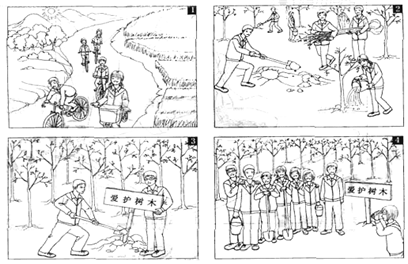题目内容
5.It is true that good writers rewrite and rewrite and then rewrite some more.But in order to work up the desire to rewrite,it is important to learn to like what you write at the early stage.I am surprised at the number of famous writers I know who say that they so dislike reading their own writing later that they even hate to look over the publishers'opinions.One reason we may dislike reading our own work is that we're often disappointed that the rich ideas in our minds seem very thin and plain when first written down.Jerry Fodor and Steven Pinker suggest that this fact may be a result of how our minds work..
Different from popular belief,we do not usually think in the works and sentences of ordinary language but in symbols for ideas (known as"mentalese"),and writing our ideas down is an act of translation from that symbolic language.But while mentalese contains our thoughts in the form of a complex tapestry (织锦),writing can only be composed one thread at a time.Therefore it should not be surprising that our first attempt at expressing ideas should look so simple.It is only by repeatedly rewriting that we produces new threads and connect them to get closer to the ideas formed in our minds.
When people write as if some strict critics (批评家) are looking over their shoulder,they are so worried about what this critic might say that they get stuck before they even start.Peter Elbow makes an excellent suggestion to deal with this problem.When writing we should have two different minds.At the first stage,we should see every idea,as well as the words we use to express it,as wonderful and worth putting down.It is only during rewrites that we should examine what we excitedly wrote in the first stage and check for weaknesses.
68.What do we learn from the text about those famous writers?C
A.They often regret writing poor works
B.Some of them write surprisingly much.
C.Many of them hate reading their own works
D.They are happy to review the publishers'opinions.
69.What do people generally believe about the way human minds work?A
A.People think in words and sentences.
B.Human ideas are translated into symbols
C.People think by connecting threads of ideas.
D.Human thoughts are expressed through pictures.
70.What can we conclude from the text?D
A.Most people believe we think in symbols.
B.Loving our own writing is scientifically reasonable.
C.The writers and critics can never reach an agreement.
D.Thinking and writing are different stages of mind at work.
分析 本文主要讲述思考和写作在工作中的不同作用,写作和思考是大脑工作地不同阶段.
解答 CAD
68 C 细节理解题.由第二段的第二句they even hate to look over the publishers'opinions可知他们甚至于不喜欢忽略出版社的观点,排除D,A,B文章中没提到;由第二段的第一句they so dislike reading their own writing later可知他们讨厌阅读自己的作品,故选C,
69 A 细节理解题.由第三段的前两句Different from popular belief,we do not usually think in the works and sentences of ordinary language but in symbols for ideas (known as"mentalese")可知受欢迎的信念是我们的大脑是按照语句思维的,故选A.其他均可以排除.
70 D 推理判断题.由第三段的第一句Different from popular belief-----排除A项;第二段的第一句they so dislike reading their own writing later,排除B;由最后一段的二、三行Peter Elbow makes an excellent suggestion to deal with this problem.When writing we should have two different minds.排除C;由第二段二、三行the rich ideas in our minds seem very thin and plain when first written down.可以看出写作和思考是大脑工作地不同阶段,选D.
点评 考察学生的细节理解和推理判断能力,做细节理解题时一定要找到文章中的原句,和题干进行比较,再做出正确的选择.在做推理判断题不要以个人的主观想象代替文章的事实,要根据文章事实进行合乎逻辑的推理判断.

Ambition,however,can have several defects.
First of all it can be unrealistic.We may not be able to see the limits of our own abilities,we do ambitious things that are completely beyond us.Our career masters can see our good qualities and our limitations objectivity.They may tell us that we haven't the ability to deal with people and would make good businessman.We refuse to take their evaluation.We keep on trying.Mary years and many disappointments later we are forced to accept their judgement.But what a waste of time our ill-founded ambition has caused us!
Secondly,our ambition can be too concentrated.We devote our attention to one narrow aim,such as getting distinctions in our science subjects.Everything that may draw us away from this aim is cut out of our lives.In the end we get our distinctions.But what damage we have caused ourselves in the process!We are isolated beings who only care about a particular examination.And we probably won't make good scientists.We lack the breadth (宽度) of view necessary for success in higher studies.
Thirdly,our ambition can be limited to lifeless objectives.We want to gain money,or power,or membership of some circles.Persons who feel inferior try to make up by seeking the respect of others through possessions of these artificial signs of worth.
Fourthly,our ambition may be self-centered.Instead of directing some of our ambition towards community improvement,we may exploit (剥削) members of the community in the interests of self-advancements.In later life we may be ambitious for the success of our children but we regard this success as only a further mark of our own success.
Ambition is necessary in the lives of individuals---necessary for their own improvement and for the improvement of the community in which they live.But,like all blind forces,it must be directed if it is not to cause disaster.It must be tightly controlled by the head and the heart.Otherwise ambition may demand too high a price in terms of human qualities.
| Title | (66)ambition |
| Merit | With an ambition in our heart,we're always trying our best to use our talent to improve ourselves,thus (67)benefiting ourselves and others. |
| (68)Imperfection | Unrealistic ambition may (69)stop/prevent/keep us from seeing the limits of our own abilities. |
| We devote our attention to one narrow aim,and we lack the breadth of view which is(70)necessaryfor greater success. | |
| Our ambition can be limited to lifeless aims,which lead us to the way to build up our reputation through (71)possessions of artificial signs of worth. | |
| Our ambition may make us among those (72) selfish/self-centered people who gain their interests by sacrificing(牺牲)(73)others'. | |
| (74) Conclusion | Ambition is a good servant but a bad master.Therefore,we must try to direct it in a proper way to (75)notcausing disaster. |
| A. | should | B. | would | C. | will | D. | shall |
| A. | being run | B. | run | C. | to run | D. | running |
